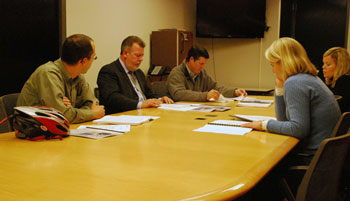Ann Arbor Audit Clean, But Issues Identified
News of an essentially clean audit for the fiscal year 2012 was delivered to the Ann Arbor city council audit committee late last year by Mark Kettner, a principal with the auditing firm Rehmann. The audit culminated the work that had begun in preliminary meetings on July 10. The fiscal year 2012 ended on June 30, 2012. [.pdf scan of letter from Rehmann]

The Dec. 20, 2012 meeting of the city council’s audit committee, from left to right: Chuck Warpehoski (Ward 5); Mark Kettner with the auditing firm Rehmann; city CFO Tom Crawford; accounting services manager Karen Lancaster; Sally Petersen (Ward 2).
The auditor’s report concluded that the city’s financial statements are presented fairly and accurately – but as Kettner stressed, that was not meant to express an opinion on the city’s overall financial condition or anything about what a great place Ann Arbor is. “I never want somebody walking away who says, ‘The auditor said everything’s okay,’ because the auditor doesn’t say that …” Kettner noted.
Also presented to the committee was the comprehensive annual financial report (CAFR). The report included the year-end numbers for the city’s general fund, which were positive. Actual revenues were about $76.5 million, which was $2.2 million more than the budgeted revenues of $74.3 million. And actual expenses were $73.5 million, or $2.1 million less than the budgeted expenses of $75.5 million. That came out to an increased fund balance of $1.6 million – from $13.7 million to $15.3 million. The city had budgeted to tap the fund balance for around $2.7 million. That meant that the general fund did about $4.3 million better than budgeted. [.pdf of CAFR]
Although the audit report was unqualified – that is, clean – some problems were identified with the city’s internal controls. One was deemed to be a “material weakness” – the most serious classification. It related to the representation of the federal portion and state portion of funds involved in revolving loans. A second problem, identified as a “significant deficiency,” involved the reconciliation of subsidiary ledgers for customers’ utility bills with the city’s overall financial system.
Not rising to the level of an actual deficiency were several other matters that Kettner felt still warranted consideration, including: payroll process (no direct supervisor signatures on timesheets); employee expense reports (instances of “double-dipping” on vehicle allowances and mileage reimbursements); related-party transactions (family member of employee with city contract); internal staff auditor reporting relationship (currently reports directly to CFO); and information technology (password and disaster recovery policies).
The auditor’s report does not include the names or positions of any of the employees involved in those matters of concern. Records provided to The Chronicle by the city, responding to a request made under Michigan’s Freedom of Information Act, indicate that one of the employees who claimed both mileage and vehicle allowance in violation of city policy was city attorney Stephen Postema. The records indicate he claimed $1,043.37 in mileage reimbursements dating from June 23, 2011, despite his vehicle allowance of $330/month. Postema’s vehicle allowance has since been eliminated by the city council, as a result of his most recent performance review. It’s not clear at this point if the city will require that the mileage money be repaid. [Updated: City administrator Steve Powers has reached a different conclusion from the auditor's on this point. See below.]
Kettner and the city’s chief financial officer, Tom Crawford, indicated to the audit committee that the material weakness and significant deficiency had been corrected so that recurrence would also be prevented. For the other matters, Crawford assured the audit committee that the goal was not to see a repeat of those same items in future years, especially for the most serious issues – involving payroll and expense reports.
The related-party transactions, Crawford told the audit committee, are currently the subject of review in the context of possible revisions to the city’s procurement policy. Kettner suggested that the city’s part-time internal auditor report directly to the audit committee, instead of to Crawford. And Crawford encouraged committee members to share any concerns with the city’s internal auditor, the city administrator, or the auditor himself – if they did not feel comfortable approaching him. Crawford indicated that the city was currently working on a disaster recovery plan for information technology, but didn’t anticipate that it would be completed by the end of this fiscal year.
The presentation by Kettner was delivered to a short-handed committee. Because just two of the five members were able to attend – Sally Petersen (Ward 2) and Chuck Warpehoski (Ward 5) – the committee didn’t achieve a quorum necessary to vote to recommend the adoption of the audit by the full council. Two audit committee members were out of town – Sumi Kailasapathy (Ward 1) and Margie Teall (Ward 4). The third absentee, Stephen Kunselman (Ward 3), was suffering from the flu. City staff present were chief financial officer Tom Crawford and accounting services manager Karen Lancaster. [Full Story]



